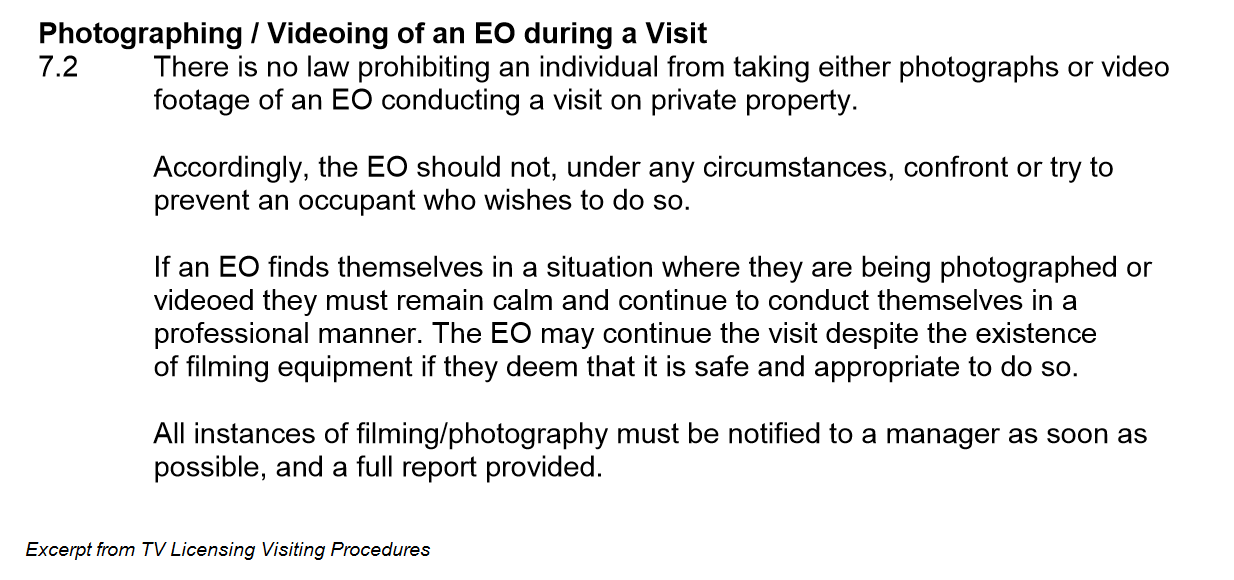It's the first time we've heard Sterling in action and we're really glad to have tuned in. In the 12 minutes of airtime dedicated to the subject of TV Licensing it's fair to say that the BBC's militant revenue generation arm faced swingeing criticism, most of it from Nolan himself.
TV Licensing frequently trawl BBC local radio stations touting for business. Ordinarily they can be guaranteed a sympathetic reception from the presenter, who receives their BBC salary from TV Licensing's immoral earnings. It was a refreshing change to hear Nolan exercise independence of thought and expression.
You can listen to the piece in full using the player below:
The segment began with Nolan and Sterling in conversation about the subject of TV Licensing sending letters to unlicensed properties:
Stephen Nolan (SN): "We've been hearing from people saying that despite them telling you (TV Licensing) they have no TV; despite them telling you there's no house on a building site; you're still pursuing them with letters".
Mark Sterling (MS): "Well, the letters we send to unlicensed addresses, we do that to let people know that if they have a TV and they're watching TV live, then they have to have a TV licence".
SN: "So it's a
fishing expedition? You're sending letters that warn people you're about to take them to court, but you have no idea if those letters are even remotely justifiable? Pick an address and threaten people with court and the BBC is endorsing it?"
MS: "These letters are not threatening. I think it's only fair that we do our best to make sure that people who do need a TV licence are paying for one. We have to be fair to the vast majority of people who do pay their licence".
SN: "But Mark, you shouldn't be threatening people who don't need a licence".
MS: "The letters aren't threatening. We do have a series of
communications like letters and phone calls and visits. If people don't need a licence we ask them to let us know that they don't need a licence. They can do that very easily online..."
SN: "But should it not be the other way around? Your letter does tell people that they can be brought before a court and prosecuted, right?"
MS: "We do make people aware of the fact that they can be fined and prosecuted if they don't have a licence".
SN: "But before you send a letter like that, should you not know if they have a television?"
MS: "That's why we ask people who don't have a TV (to let us know) - it's not just the TV as well Stephen, we have to remember that if you're watching TV on a phone or a laptop..."
SN: "Sure, we get that. But before you threaten someone with court - that's what the letter does - should you not know if they are using the service? That they're consuming the BBC?"
MS: "Well we do ask people just to simply let us know if they don't need a licence. If they don't need a licence it's easy to let us know and they won't hear from us then for up to 2 years."
SN: "That's very good of you; that's very good of the BBC, isn't it? So someone is told they are guilty and they have to prove their innocence first?"
MS: "We just ask people if they don't watch TV programmes as they're shown live, if they let us know. They can do that very simply online or on the phone..."
SN: "Apparently they can't do it online".
Nolan then took calls from two listeners who had experience of dealing with TV Licensing:
Caller Steven: "It's not very easy to let the TV Licensing people know that you don't need a licence. I spent 15 minutes on the phone to them and then gave up".
Caller Nathan: "I manage a butchers shop in Belfast and we regularly get letters saying that we don't have a TV licence. I've phoned (TV Licensing) on several occasions, asking them to come and inspect the premises - we don't have a TV, we're a butchers shop.
"I told TV Licensing and the letters stopped for 2 months and they have the cheek to print 'made from recycled paper' on the bottom of them".
Nolan and Sterling then went on to discuss Nathan's case in some more detail:
SN: "The question is, if you have actually gone to the bother of telling you guys (TV Licensing) 'I have no (need for) TV licence', should you be receiving more threats 2 months later?"
MS: "If people tell us they don't require a TV licence they shouldn't hear from us for up to 2 years".
SN: "Up to 2 years gives you a lot of wriggle room, because up to 2 years could mean anywhere between a day and 2 years".
MS: "Sorry, sorry - I should clarify that they won't hear from us for 2 years".
Something else Sterling added in before the end of the interview:
MS: "The revenue generated by those letters significantly outweighs the costs of sending them".
Having taken a few moments to reflect on Sterling's woeful performance, there are two issues we have real concerns about. Firstly, Sterling's deluded denial that TV Licensing letters are threatening; secondly TV Licensing's alarming mentality that "if you don't tell us you don't need a TV licence, you can't complain when we send you threatening letters".
Remember that a TV licence is only needed for those properties where equipment is used to receive "live" broadcast TV programmes. Anyone who doesn't need a licence is under no legal obligation to co-operate with TV Licensing at all and we strongly recommend they don't.




















